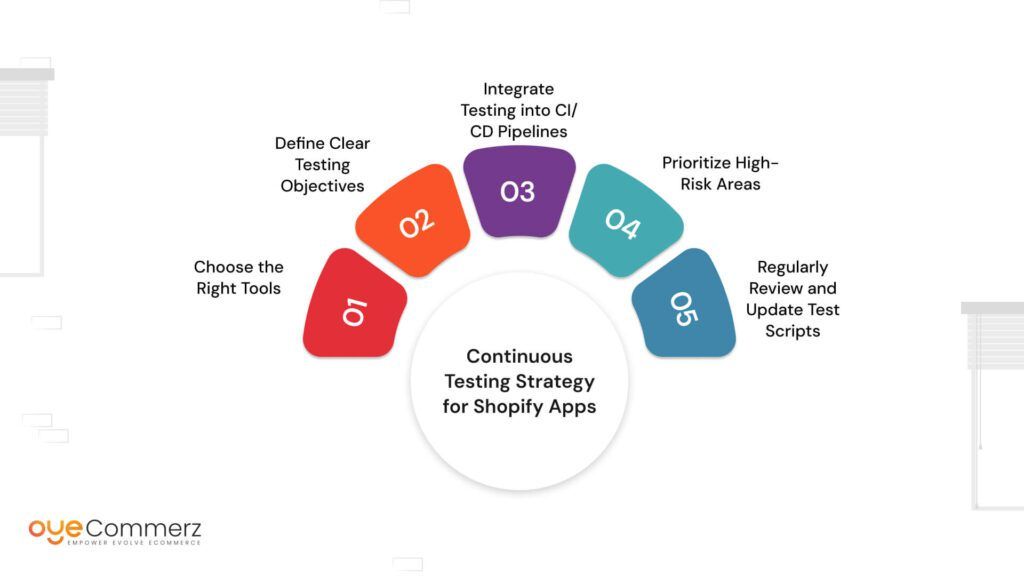In the world of e-commerce, maintaining seamless functionality in your Shopify apps is crucial, especially as updates roll out. For enterprise-level businesses, even a minor bug introduced during an update can lead to operational hiccups, lost revenue, and diminished customer trust. This is where Shopify app regression testing becomes indispensable. By thoroughly testing apps after updates, businesses ensure that new features don’t disrupt existing functionalities.
Investing in a robust Shopify app development solution that includes comprehensive regression testing is essential for enterprises aiming to stay competitive. These solutions help detect and fix issues before they impact customers, maintaining the high-performance standards expected in enterprise-grade e-commerce. With Shopify powering millions of businesses worldwide and facilitating $9 billion in global sales during Black Friday and Cyber Monday 2023, ensuring app stability through regression testing is a non-negotiable priority.
In this blog, we’ll explore the importance of regression testing, its process, and how it integrates with Shopify app development solutions to keep your apps bug-free after updates.
Table of Contents
ToggleThe Importance of Shopify App Continuous Testing
Continuous testing involves executing automated tests at every stage of the software development lifecycle to ensure quality and catch issues early on. It ensures that any changes or updates to your Shopify app do not introduce bugs or compromise performance. For large-scale e-commerce operations, this approach is critical. A small bug in your app could result in poor customer experiences, reduced conversion rates, and lost revenue.
According to a 2023 report by Statista, 79% of online consumers say that poor website or app performance directly impacts their decision to make a purchase. For enterprises operating on Shopify, maintaining app quality is not optional; it’s essential for staying competitive in the e-commerce space. By integrating continuous testing into your development process, you can catch bugs early, ensure consistent performance, and build trust with your customers.
Key Benefits of Continuous Testing for Shopify Apps
- Faster Time to Market: Continuous testing allows for rapid iteration without compromising quality.
- Early Bug Detection: Bugs are identified and addressed before they impact end users.
- Improved Customer Experience: A smooth, bug-free app leads to better customer satisfaction and retention.
The Role of Shopify App QA Automation
What is Shopify App QA Automation?
Shopify app QA automation refers to using automated tools to perform repetitive and complex testing tasks, reducing manual effort and ensuring consistent results. With automation, your testing team can execute thousands of test cases in a fraction of the time it would take manually, allowing you to scale testing efforts as your app grows.
Automation is particularly valuable for large e-commerce businesses that manage multiple integrations and frequent updates. By automating key quality assurance (QA) processes, you can ensure your Shopify app delivers a flawless experience across different devices, browsers, and platforms.
How Shopify App QA Automation Improves Efficiency
- Time-Saving: Automated tests can run around the clock, shortening testing cycles.
- Comprehensive Coverage: Automation allows you to test multiple scenarios, including edge cases, without missing details.
- Consistent Results: Unlike manual testing, automated tests eliminate human error and provide reliable, repeatable results.
Best Tools for Shopify App QA Automation
- Selenium: An open-source testing tool widely used for browser-based applications.
- TestComplete: A powerful tool that offers a scriptless environment, making it easier for non-developers to create automated tests.
- Ranorex: An all-in-one tool for desktop, web, and mobile testing.
Why It Matters for Enterprises
For large e-commerce businesses using Shopify, automating QA processes ensures that updates and new features can be deployed quickly without sacrificing quality. Automation allows your team to focus on more approach tasks, such as improving customer experience and optimizing performance.
The Importance of Shopify App Regression Testing
What is Regression Testing?
Shopify app regression testing is a critical aspect of continuous testing. It involves re-running test cases to ensure that any recent changes or updates to the app have not affected existing functionality. With frequent updates and integrations, e-commerce apps are prone to regression errors, where new code introduces issues in previously stable features.
According to a report by MarketsandMarkets, the market for automation testing is expected to scale at a CAGR of 19% from 2021 to 2027. This rapid growth reflects the increasing need for automated regression testing tools, especially in industries like e-commerce where changes happen frequently and at scale.
Why Shopify App Regression Testing is Essential?
- Ensure Stability: Regression testing helps maintain app stability after updates, ensuring that all features continue to function as expected.
- Prevent Downtime: Downtime due to bugs can be costly for enterprise-level businesses. Continuous regression testing helps identify and fix issues before they cause downtime.
- User Confidence: Regular regression testing ensures users can trust the app to function consistently, even after updates.
Effective Tools for Shopify App Regression Testing
- TestRail: A test management tool that manage and monitor regression tests.
- Appium: A mobile-focused automation tool ideal for testing Shopify apps on Android and iOS devices.
- BrowserStack: Allows for cross-browser testing, ensuring your Shopify app performs well across different browsers and devices.
Why It Matters for Enterprises
Continuous Shopify app regression testing is essential for maintaining the integrity of your app’s functionality. As you release new updates, regression testing ensures that existing features continue to perform optimally, preventing disruptions that could harm customer trust and sales.
Implementing a Continuous Testing Strategy for Shopify Apps

How to Get Started with Continuous Testing
To implement continuous testing for your Shopify app, follow these best practices to ensure your process is efficient and effective.
1. Choose the Right Tools
The foundation of any successful testing strategy is selecting the right tools. Choose tools that integrate seamlessly with your development pipeline and offer robust automation features. Look for tools that support both Shopify app QA automation and Shopify app regression testing.
2. Define Clear Testing Objectives
Establish what you aim to achieve with continuous testing. Whether it’s reducing bugs, improving app performance, or speeding up the release cycle, having clear goals will guide your testing strategy.
3. Integrate Testing into CI/CD Pipelines
Continuous integration and delivery (CI/CD) pipelines allow your team to push code changes frequently while ensuring the app remains stable. Integrating continuous testing into your CI/CD process ensures that any issues are caught early, long before they reach production.
4. Prioritize High-Risk Areas
Focus your testing efforts on the areas of your Shopify app that are most critical to performance and user experience. This ensures that high-risk features, such as payment gateways or inventory systems, are thoroughly tested before updates are deployed.
5. Regularly Review and Update Test Scripts
Your testing strategy should evolve as your app grows. Regularly reviewing and updating test scripts ensures they remain relevant to the current state of your app.
Metrics to Track Continuous Testing Success
- Test Coverage: Ensure you have high test coverage across your Shopify app’s critical functions.
- Bug Detection Rate: Track how many bugs are detected early in the testing process.
- Deployment Time: Measure how quickly updates can be released after testing is complete.
- App Stability: Monitor key performance indicators like app uptime and error rates.
Ensure App Quality with Oyecommerz
We specialize in Shopify app continuous testing to guarantee seamless updates, bug-free functionality, and a superior user experience. Whether you need Shopify App Regression Testing or help Writing Effective Test Scripts for Shopify Apps, our team is here to support your app’s growth and stability.
Get in touch today to optimize your app’s quality and stay ahead in the competitive e-commerce landscape!
Let's build your custom Shopify app today!
Conclusion
Ensuring the quality and performance of your Shopify app through continuous testing is crucial for maintaining a competitive edge in this dynamic market. By integrating Shopify app QA automation into your development lifecycle, you can detect issues early, minimize downtime, and deliver a seamless user experience. Pairing this with a scalable Shopify app development strategy ensures your app can adapt to growing business needs, handle increased traffic, and support new features without compromising performance. For enterprise-level e-commerce businesses, continuous testing combined with scalability is not just a technical necessity—it’s a strategic advantage that drives growth, fosters customer trust, and secures long-term success.




